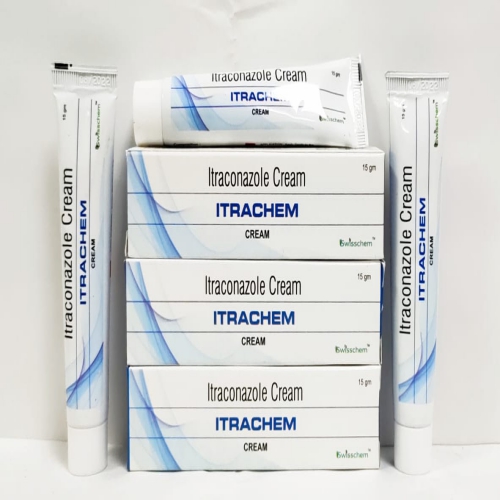Itraconazole Cream
ITRACHEM
Fungal infections are treated with itraconazole. It is used to treat fungal skin infections, finger and toenail infections, and thrush in the vagina, mouth, and other regions of the body.
Uses of Itraconazole cream
The following illnesses, problems, and symptoms are treated, managed, prevented, and improved with itraconazole cream:
- Fungal contamination
- Mycobacterial infections
- Flaky, discolored spots on the back and chest
- Infections in individuals with neutropenia or AIDS
How the medication works
Itraconazole is called Antifungal drug. By dissolving the fungus’ cell membrane, it kills it and prevents further growth, treating your skin infection.
Side Effects of Itraconazole Cream
The potential negative effects of medications containing itraconazole cream are listed below. This isn’t an exhaustive list. These negative effects are conceivable but not guaranteed. Some of the negative effects could be uncommon yet severe. If you experience any of the negative effects listed below, especially if they persist, speak with your doctor.
- A rash with itchy skin
- A yellowing of the skin
- Elevated levels of liver enzymes in the blood
- A feeling of being out of breath
- A change in preferences
- Infection of the upper respiratory tract
- The nose is running
- Deficiency in appetiteRash
- Chronic headache
Precautions
- Inform your doctor about all of your current prescriptions, over-the-counter goods (including vitamins, herbal supplements, etc.), allergies, pre-existing problems, and current health conditions before using itraconazole cream.
- You can be more susceptible to the drug’s side effects if you have certain medical conditions. Follow your doctor’s instructions or the instructions on the package insert when taking. Your condition will determine your dosage. If your issue persists or gets worse, let your doctor know.
- Do not mix any other cream with this medication as this can lead to an allergic reaction and may pose extremely harmful effects on your skin.
- Tell your doctor if you or if you have or have ever had any kind of allergies, especially about any problems with your skin.
- Never skip any doses and finish the entire course of treatment even if you feel better. Stopping the use of medicine early may make the infection harder to treat.
- Even if you feel better, do not miss any doses and complete the entire course of treatment.
- Use it, preferably at the same time every day, as mentioned on the label or as prescribed by the doctor.
- If you experience allergic reactions, let your doctor know about it.
The following list of key counseling points is provided.
- Never operate a vehicle or machinery.
- Feel dizzy, have diarrhea, or have trouble controlling your urination or excessive urination. Have hearing loss, hearing problems, or ringing in the ears.
- Suffer from AIDS, liver, or renal issues.
FAQs
Ques. What is Itraconazole used for?
Ans. It is used for Fungal contamination, Mycobacterial infections, Flaky discolored spots on the back, and chest Infections in individuals with neutropenia or AIDS.
Ques. For how long do I need to take Itraconazole?
Ans. The type and location of the illness, as well as your reaction to the medication, will determine the dosage and duration of the treatment. For instance, you might need to take Itraconazole for 30 days if you have athlete’s foot or a fungal infection of the skin on your feet and in between your toes. On the other hand, depending on the amount recommended by the doctor, the dose may take anywhere between one and three days if you’re taking it for a vaginal candidal infection.
Ques. What should I do if I skip a dose of Itraconazole?
Ans. If you skipped the dose by any chance, you can take the missed dose as soon as possible but do not take the dose if it’s time for the next dose. Do not double dose as this can be harmful to you.a






